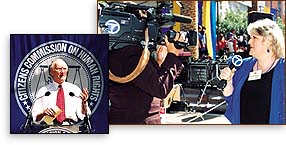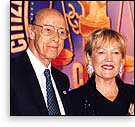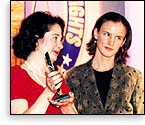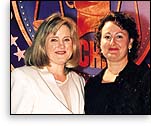
|

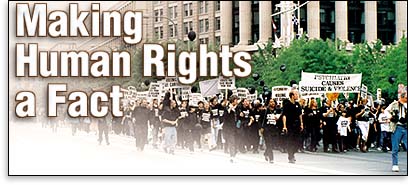
|
Members of the Citizens Commission on Human Rights bring psychiatric abuse and fraud to the attention of the public.
by Mark Stout |

hen talk turns to human rights, one would normally expect events in places like the former Yugoslavia, China or Rwanda to dominate the discussion. One would little expect to hear of atrocious abuses at home in the United States or even in other “developed” nations. And certainly not at the hands of trusted, degree-holding professionals who walk freely among us.
Yet such abuses exist; they are very real, and they are the focus of the Citizens Commission on Human Rights (CCHR), a group dedicated to investigating and exposing psychiatric violations of human rights. “To say that psychiatry violates human rights is a misnomer,” says Dr. Thomas Szasz, professor emeritus at the State University of New York. “Psychiatry is a human rights abuse.”
Szasz, himself trained in psychiatry and author of the leading texts critical of the field, worked with the Church of Scientology in 1969 to found CCHR. At that time, according to a CCHR report, the victims of psychiatry were a “forgotten minority group, warehoused under dreadful, even terrifying conditions” in institutions around the world. Today a leading and powerful voice for mental health reform, with recognitions from the United Nations and other private and governmental bodies, CCHR is now active with 130 chapters in 30 countries.
And when CCHR celebrated its 30th anniversary at the Bonaventure Hotel in the heart of downtown Los Angeles in March, it was with Hollywood stars and recording artists, award winners who came from as far as halfway across the globe for the occasion, and a house packed with hundreds of human rights activists and supporters from around the world. By any measure, the event reflected the impressive accomplishments of this unique organization.
“An Important Message”
More than an anniversary gala, the evening was an opportunity to send what CCHR international president Jan Eastgate termed “an important message” and to acknowledge “individuals of courage and persistence who have joined the battle” against psychiatric abuses.
Actress Lee Purcell, Mistress of Ceremonies for the evening, framed that message at the outset of the evening when she described CCHR’s “worldwide quest for the abolition of cruel and physically harmful psychiatric practices and to restore human rights to the field of mental health.”
CCHR’s history has been one of exceptional growth and accomplishment, Purcell noted, considering that it “entered a world almost wholly ignorant of the nature, extent and effects of psychiatric practice and control.”
Those effects, as explained further by keynote speaker Reverend Heber Jentzsch, President of the Church of Scientology International and a founding member of CCHR, came from psychiatry’s deeply imbedded antipathy to human rights. As Jentzsch related, in 1776 the father of American psychiatry, Dr. Benjamin Rush — whose face adorns the seal of the American Psychiatric Society today — justified slavery because, Rush said, blacks suffered from an incurable “disease” called “negritude.” Jentzsch further unfolded the unabashed 1940 plans of another of psychiatry’s forefathers, the British J. R. Rees, for psychiatry to infiltrate and take over the fields of religion, medicine, law and education; and the unequivocal proposal in 1946 of World Federation of Mental Health founder Brock Chisholm to eradicate the concepts of right and wrong.
Awards Presented
Standing in stark contrast to psychiatry’s darkly stained foundations were those individuals acknowledged during the evening with CCHR’s International Human Rights Award for perseverance in exposing human rights violations.
Christine Hahn, journalist with Brabant Newspapers of Ontario, Canada, was presented with the award by Purcell for her investigation of a scam involving abuse and brokering of brain injured patients between Canada and the United States. Prior to Hahn’s investigation, abuses reported by patients — such as being slammed into furniture, pulled by the hair, and needlessly restrained by psychiatric staff — had been dismissed as psychotic ramblings.
“When I first started writing about brain injury patients in 1996, I thought the story was about one patient and one hospital. I could not have been more wrong,” Hahn said. “It was a multi-billion dollar cross border psychiatric industry created to take advantage of the most vulnerable people in our society.”
Hahn also accepted the human rights award for Toni Skarica, Canadian Member of Parliament recently appointed Chairman of Ontario’s Crime Control Commission, and the man Hahn asked to help the victims she had found. Skarica joined the investigation in 1997, visiting facilities in New York and Texas. His investigation resulted in the Texas Attorney General filing a lawsuit against a psychiatric hospital chain involved, the return home for Canadian patients detained in U.S. facilities, and a crackdown on fraud.
When fellow journalist and CCHR award winner Ms. Toni Eatts first contacted CCHR in Sydney, Australia almost two decades ago, she, like Hahn, did not anticipate the magnitude of what she was about to discover. As told by actress Nancy Cartwright in her introduction to Eatts, the journalist intended only to get some information on one of several psychiatrists who practiced “Deep Sleep Treatment” for a book she estimated would be six months in the making. Deep Sleep Treatment (DST) consists of knocking patients into a drug-induced, near-comatose state for as much as several months on end, during which time they are repeatedly subjected to brain damaging electric shock, with the purpose of re-conditioning how they think and behave. CCHR had been investigating reported deaths from DST at Sydney’s Chelmsford Hospital, the home of DST’s prime author, Dr. Harry Bailey.
Six months became a decade while Eatts worked alongside CCHR, whistleblowers and victims, and formed the Chelmsford Survival Group to battle a bureaucracy insensitive to the situation. In Australia, 1,100 people were documented to have been subjected to the brutality of DST between the 1960s and 1980s, and a known 48 victims died. Eatts generated unprecedented national media coverage on the abuses at Chelmsford and sparked a two-year Royal Commission Inquiry which resulted in compensation for 283 victims and the ban of DST.
CCHR’s Human Rights Leadership Award also went to Ms. Beverly Eakman of the United States for her tireless efforts to expose psychiatry’s destructive influence on children. Actress Juliette Lewis, herself outspoken against the psychiatric drugging of children, presented the award on behalf of CCHR.
When Mrs. Eakman settled on a career as a teacher in the public school system, she intended to teach literature and other academic basics. However, she soon found that schools were becoming psychological laboratories, where she was expected to advance psychiatric and psychological-based programs for shaping childrens’ behavior, without parental knowledge or consent. Eakman fought the incursion and turned to the media for assistance, thinking that it would be a fairly simple matter to obtain coverage of what she found. She took documentation of the forced drugging of children, psychological tests which masqueraded as academic tests, and behavior modification programs which were conducted in the classrooms to the top echelons of various newspapers and television news magazines. “While their eyes would get wide as saucers,” Eakman said, “they all in the end said it was too difficult to do that kind of writing. So I decided to do the job myself.”
Eakman first did that job with the publication of her book, Educating For a New World Order. She since formed the National Education Consortium, became a CCHR International Commissioner and published a second book, The Cloning of the American Mind: Eradicating Morality Through Education.
The final award, a special category for performing artists, was presented by the President of CCHR International, Ms. Jan Eastgate, to platinum-award winning musician David Pomerantz for his work on behalf of CCHR. Pomerantz’ song, “Invisible Criminals,” Eastgate said, “is a gripping rendition of the tragedy and destruction accompanying psychiatric practice” and has become the unofficial theme song of CCHR International, she said.
Making Human Rights a Fact
“To say psychiatry violates human rights is a misnomer. Psychiatry is a human rights abuse.”
– Dr. Thomas Szasz
Professor Emeritus State University of New York
|
Among the factors that led to CCHR’s establishment in 1969 were the words of author and humanitarian L. Ron Hubbard, who declared that “the most basic laws of humanity had been broken” by psychiatrists and that “human rights must be made a fact, not an idealistic dream.” As an inspiration behind CCHR, Mr. Hubbard was acknowledged by Mr. Irving Sarnoff, the founder of Friends of the United Nations, a group which educates and advises citizens and governments on the United Nations Universal Declaration of Human Rights.
Though written more than 50 years ago, the Universal Declaration of Human Rights remains an unrealized ideal to 99 percent of the world. “Mr. Hubbard recognized this tragedy,” Mr. Sarnoff said. “He was particularly aware of how psychiatrists violated this declaration. He wrote that their lack of humanity was easy to see in their commitment laws which deny patients due process of law.”
Presenting the award, Mr. Sarnoff said, “Mr. Hubbard gave us a vision, a technology, and a movement to save our world for future generations. Because of him, millions are working to make the world a better place.” The award was accepted by the L. Ron Hubbard Personal Public Relations Officer for the Western United States, Kaye Conley.
CCHR has worked closely for 30 years with other concerned groups, citizens and community leaders to document and inform the public of the destructive effects of psychiatric treatments such as electric shock, psychosurgery, and drugging. Accomplishments of CCHR International over the past year were announced by its president, Jan Eastgate.
Canadian journalist Christine Hahn was presented CCHR’s human rights award for her investigation of a scam involving abuse and brokering of brain-injured patients between Canada and the United States. Her work fueled a major crackdown on psychiatric fraud.
|
|
Among them was the publication of one of the group’s most compelling publications to date, Harming Lives: Psychiatry — Betraying and Drugging Children. The booklet, which exposes and documents the psychiatric industry’s campaign to drug children for profit, has been translated into 14 different languages and distributed in 30 countries. After its release, emotionally charged public hearings into the abuse of children and families by psychiatrists and psychologists were held in New York and Los Angeles.
But whether fighting psychiatric invasions of patients’ rights or preventing the psychiatric drugging of school children, by evening’s end it was more than clear that CCHR’s efforts are both vital and urgent.
“A wide gap exists between what has been and what should be in the field of mental health,” Ms. Eastgate said. “What has been is possibly the greatest crime of all time. What should be is an atmosphere characterized by tolerance, safety, purity and respect for people’s lives. While a lot remains to be done, what will be is now most certain. With the combined effort of CCHR and numerous other organizations, individuals, and you,” she told the audience, “we are bringing dignity and decency to the field of mental health.”
“Were it not for CCHR,” said Dr. Thomas Szasz when writing on CCHR’s accomplishments, “I wonder if anyone would know the truth. Instead, thanks to their work, millions know. This has never happened before in human history.”
|

|


